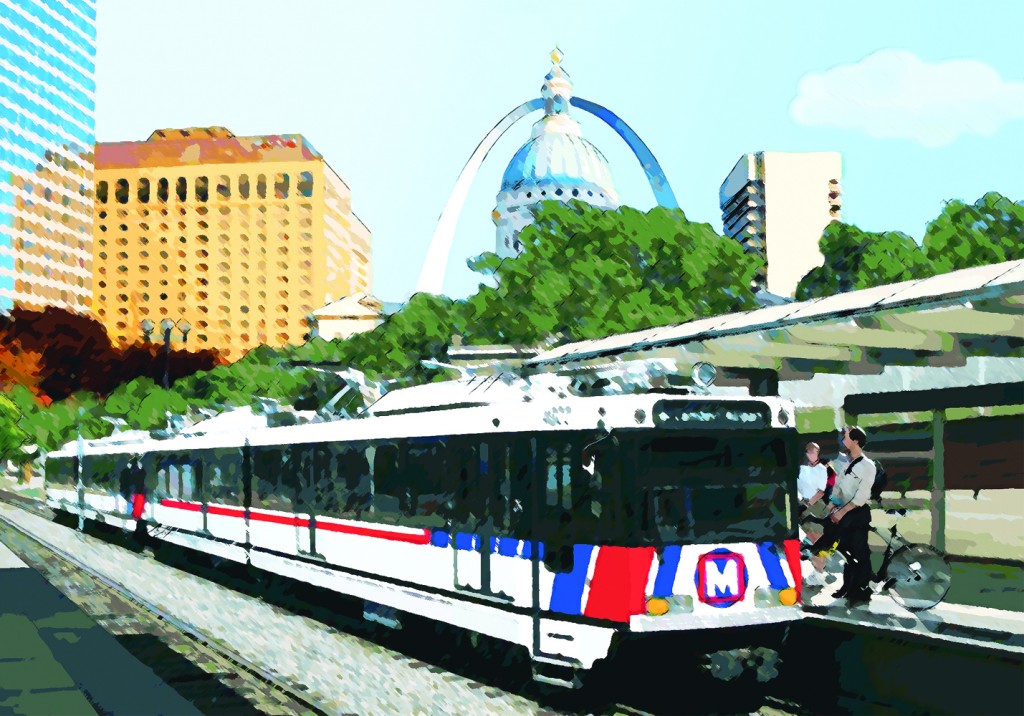 Citizens for Modern Transit’s Case for Transit & Transit Funding (download this Q&A here.)
Citizens for Modern Transit’s Case for Transit & Transit Funding (download this Q&A here.)
-
How much are St. Louisans spending on transportation?
The average household in St. Louis currently spends almost 20 percent of its budget on transportation, obscuring the fact that this region is an affordable place to live.
According to the Location Affordability Portal run by HUD , median income households with 2 commuters in St. Louis spend 19% of their income on transportation. They own 1.8 vehicles per household and travel just over 20,000 miles a year. For a working individual, that cost goes up to 26% of income. For low-income individual, it is 40%.
-
What is an average commute time for transit?
According to the Brookings Institute and Transportation for America, in the St. Louis metropolitan area 68 percent of jobs are located in neighborhoods with access to transit. However, only 24 percent of the city’s population can reach jobs within 90 minutes via public transit. St. Louis needs more transit.
-
Where does St. Louis rank nationally with regards to transit access?
Compared to other U.S. cities, St. Louis ranks 58th when it comes to transit access, translating to a lower level of economic mobility for our region. St. Louis needs more transit.
-
Do St. Louisans use the system we have?
MetroLink provides transit service to 17 million local riders a year, making it the 8th largest light rail in U.S. ridership. MetroBus has 75 routes and almost 100,000 daily boardings, positioning it as the 30th largest bus system in the nation. In order to build this system, St. Louis needs more funding for transit.
-
What transportation projects does CMT support?
CMT recognizes there are several potential transit expansion corridors and service innovations which have received extensive public attention and review by East-West Gateway Council of Governments. CMT supports transit expansion, however the St. Louis region currently lacks funding to move any large-scale capital public transit project forward. Therefore, CMT has taken a practical approach to the challenges transit faces in the region and views finding a funding package for transit expansion as the issue that takes precedent at this time.
-
How much support does the State of Missouri provide for transit?
Nationally, Missouri ranks near the bottom of states funding public transit. Last year alone, Metro/Bi-State Development Agency, the largest transit agency in the state with a $250 million plus budget, received only slightly more than $400,000 from the State of Missouri for its capital/operating needs. St. Louis needs more funding for transit.
-
Are there local monies available for transit expansion that are being unused?
Currently, the City of St. Louis appropriates all funding it receives from Prop. M annually to Metro. In St. Louis County, all proceeds from Prop. M are appropriated to Metro while approximately 65 percent of Prop. A funds are appropriated to Metro for operations. The remaining funds are placed in a capital account for future expansion in St. Louis County.The current balance in the St. Louis County transit capital account is $20,962,150.36 according to the St. Louis County treasurer. In the past two years, $30,000,000 on October 1, 2014 and $75,000,000 on August 1, 2013 was spent to pay down the bonds for the Cross County MetroLink expansion.
-
I want more transit now, what are the next steps?
Any large scale transit expansion project will require funding and time. For example, to move the Northside/Southside light rail project included on the region’s list of ‘illustrative’ projects( projects that are regional transit priorities but have no funding attached) forward, the region would need the following:
- An Environmental Impact Study estimated to cost $4 million and take approximately two years.
- Another $2 billion to build with estimated four to five more years of work on the fast track.
-
What else can transit do for the St. Louis community?
More and more development is occurring near transit. CMT has tracked more than $16 billion since the opening of MetroLink in 1993. One of the latest developments is The Crossing in Clayton, $72 million residential with mixed used on first floor one block from Clayton MetroLink station. There is a direct return on investment with transit for the region. According to the American Public Transit Association, every dollar invested in transit provide a $4 return to the region’s economy.
Transit must and can move forward in the region. We can move forward both incremental projects and a larger vision, but only as funding allows. Transit provides the opportunity for all of us from all walks of life to ride together, to grow together, and to be connected. CMT’s “job one” is to find a funding mechanism which works for this region and to build much needed support to ensure transit connects us to our communities and each other. We are taking the steps to make transit expansion possible and we hope you will get on board.